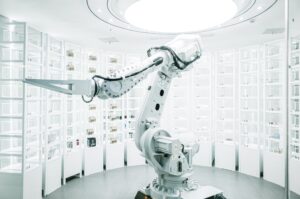
Are you tired of making decisions based on guesswork and assumptions? Enter AI in decision making! With the power of artificial intelligence, decision-making algorithms, machine learning, and predictive analytics, businesses can make informed decisions that pave the way for success.
But wait, there’s more! With AI, data-driven decision making becomes a breeze. You can automate decision-making processes, reduce human error, and improve efficiency. It’s like having a personal assistant who never makes mistakes.
But that’s not all – cognitive computing takes it to the next level. AI-powered decision support systems can analyze complex information, provide insights, and assist decision makers in making intelligent decisions. It’s like having a team of experts working around the clock.
And let’s not forget about intelligent decision making. AI algorithms can learn from past decisions, adapt to changing scenarios, and make intelligent recommendations. It’s like having a crystal ball that actually works!
But before you jump on the AI bandwagon, you may have some questions. Is it reliable? What’s the impact on job roles? What about ethical considerations? Don’t worry – we’ve got you covered. In the next section, we’ll answer all your burning questions about AI in decision making.
The Power of Data-Driven Decision Making with AI
Are you tired of making business decisions using outdated or incomplete data? Say hello to AI-powered data-driven decision making! By utilizing artificial intelligence, businesses can now process and analyze large amounts of data to make strategic decisions with little to no human intervention.
With automation in decision making, processes are streamlined, efficiency is improved, and the risk of human error is greatly reduced. Data-driven decision making not only saves time and resources but also leads to better outcomes. Not to mention, it’s much cooler to say you made a decision based on data and technology than just a gut feeling.
The Benefits of Data-Driven Decision Making
- Improved accuracy: When decisions are based on data, rather than intuition, the accuracy of those decisions increases.
- Increased efficiency: AI-powered systems can analyze data quickly and provide insights in real-time, reducing the time it takes to make decisions.
- Cost savings: Data-driven decision making leads to fewer errors and less wasted resources, resulting in cost savings for businesses.
- Competitive advantage: Businesses that utilize data-driven decision making have a competitive advantage over those that do not, allowing for better performance and growth.
By utilizing artificial intelligence in data-driven decision making, businesses are able to make more informed, efficient, and profitable decisions. It’s time to let go of outdated decision-making processes and embrace the power of data and technology.
Cognitive Computing: Enhancing Decision Support Systems
Are you tired of making decisions without enough information or insights? Look no further than cognitive computing, which can enhance your decision support systems with its advanced AI-powered capabilities.
Cognitive computing is a subset of AI that focuses on developing machines that can understand complex data and make decisions based on that information. By using natural language processing, machine learning, and other advanced algorithms, cognitive computing systems can analyze large datasets and provide valuable insights to decision makers.
One of the main benefits of cognitive computing in decision support systems is its ability to handle unstructured data. This can include text, images, and even sound, which traditional decision-making algorithms may struggle to process. By analyzing this data, cognitive computing can surface hidden patterns and connections that may not be immediately apparent to the human eye.
Take, for example, the healthcare industry. Cognitive computing can analyze vast amounts of patient data to identify potential health risks, predict future complications, and recommend personalized treatment plans. This not only improves patient outcomes but also helps healthcare providers make more informed decisions.
Another application of cognitive computing can be seen in finance. By analyzing market trends, customer behavior, and other influential factors, cognitive computing can provide insights and recommendations to traders and investment managers. This can lead to more profitable investment decisions and can potentially mitigate financial risks.
Overall, cognitive computing is a game-changer in decision support systems, with its ability to analyze complex data and provide valuable insights. By incorporating this technology into your decision-making processes, you can make more informed and intelligent decisions that drive success for your business.
Leveraging Intelligent Decision Making through AI
Are you tired of making decisions based on gut feeling? Fear not! Artificial intelligence (AI) is here to save the day with its ability to learn from past decisions, adapt to changing scenarios, and provide intelligent recommendations.
Intelligent decision making through AI is not just a pipe dream or a scene from a sci-fi movie. It is a reality that many organizations are already leveraging to gain a competitive edge. For instance, Netflix uses AI algorithms to track user behavior and recommend personalized content, while Procter & Gamble relies on AI-powered simulations to optimize its supply chain management.
AI-powered decision-making systems are also scalable, which means they can adapt to meet the needs of both small and large businesses. With AI, businesses can process large amounts of data in real-time, analyze and visualize complex information, and make data-driven decisions that lead to positive outcomes.
But perhaps the most impressive aspect of AI in decision making is its ability to learn and improve over time. By analyzing data from past decisions and feedback, AI algorithms can refine their recommendations and become more accurate and reliable over time. This means that businesses can leverage AI to continuously improve their decision-making processes and enhance their overall operations.
So, what are you waiting for? Embrace the power of AI in decision making and unlock your organization’s full potential.
Frequently Asked Questions about AI in Decision Making
So, you’ve heard about AI in decision making and you’re probably wondering what it’s all about. Here are some of the most frequently asked questions about AI in decision making, answered with a witty twist.
How reliable is AI in decision making?
About as reliable as a Magic 8-ball, if you don’t have the right data. With appropriate data sets and properly trained algorithms, AI can outsmart even the smartest human.
Will AI in decision making replace human decision makers?
Only if you let it; humans are still needed to interpret the insights and make the final call. Plus, AI can’t enjoy a beer after work, can it?
What ethical considerations should be taken into account when using AI in decision making?
Just because we can doesn’t always mean we should. Make sure decisions made by AI align with your organization’s values and ethics. Don’t let the robot uprising start with you.
What are the challenges of implementing AI in decision making?
Aside from training and data quality, the biggest challenge is probably dealing with the aftermath of your co-workers learning you’ve been replaced by a machine. But hey, at least you can sleep in and show up in your pajamas, right?
AI in decision making has the potential to revolutionize the way businesses make decisions. While it may not be a silver bullet and there are certainly challenges to overcome, AI can provide invaluable insights and streamline decision-making processes. As with any new technology, approach with caution, humor, and a willingness to learn.







2 thoughts on “AI in Decision Making: Unlock Your Potential”